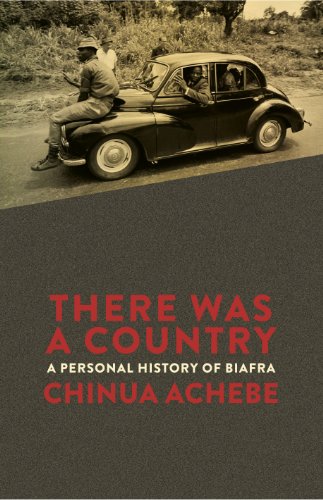Items related to There Was a Country: A Personal History of Biafra

"synopsis" may belong to another edition of this title.
The rain that beat Africa began four to five hundred years ago, from the “discovery” of Africa by Europe, through the transatlantic slave trade to the Berlin Conference of 1885. That controversial gathering of the world’s leading European powers precipitated what we now call the Scramble for Africa, which created new boundaries that did violence to Africa’s ancient societies and resulted in tension-prone modern states. It took place without African consultation or representation, to say the least.
Great Britain was handed the area of West Africa that would later become Nigeria, like a piece of chocolate cake at a birthday party. It was one of the most populous regions on the African continent, with over 250 ethnic groups and distinct languages. The northern part of the country was the seat of several ancient kingdoms, such as the Kanem-Bornu—which Usman dan Fodio and his jihadists absorbed into the Muslim Fulani Empire. The Middle Belt of Nigeria was the locus of the glorious Nok Kingdom and its world-renowned terra-cotta sculptures. The southern protectorate was home to some of the region’s most sophisticated civilizations. In the west, the Oyo and Ife kingdoms once flourished majestically, and in the midwest the incomparable Benin Kingdom elevated artistic distinction to a new level. Across the Niger River in the East, the Calabar and the Nri kingdoms flourished. If the Berlin Conference sealed her fate, then the amalgamation of the southern and northern protectorates inextricably complicated Nigeria’s destiny. Animists, Muslims, and Christians alike were held together by a delicate, some say artificial, lattice.
Britain’s indirect rule was a great success in northern and western Nigeria, where affairs of state within this new dispensation continued as had been the case for centuries, with one exception—there was a new sovereign, Great Britain, to whom all vassals pledged fealty and into whose coffers all taxes were paid. Indirect rule in Igbo land proved far more challenging to implement. Colonial rule functioned through a newly created and incongruous establishment of “warrant chiefs”—a deeply flawed arrangement that effectively confused and corrupted the Igbo democratic spirit.
Africa’s postcolonial disposition is the result of a people who have lost the habit of ruling themselves. We have also had difficulty running the new systems foisted upon us at the dawn of independence by “our colonial masters.” Because the West has had a long but uneven engagement with the continent, it is imperative that it understands what happened to Africa. It must also play a part in the solution. A meaningful solution will require the goodwill and concerted efforts on the part of all those who share the weight of Africa’s historical burden.
Most members of my generation, who were born before Nigeria’s independence, remember a time when things were very different. Nigeria was once a land of great hope and progress, a nation with immense resources at its disposal—natural resources, yes, but even more so, human resources. But the Biafran war changed the course of Nigeria. In my view it was a cataclysmic experience that changed the history of Africa.
It is for the sake of the future of Nigeria, for our children and grandchildren, that I feel it is important to tell Nigeria’s story, Biafra’s story, our story, my story.
"About this title" may belong to another edition of this title.
- PublisherAllen Lane
- Publication date2012
- ISBN 10 1846145767
- ISBN 13 9781846145766
- BindingHardcover
- Edition number1
- Number of pages319
- Rating
Buy New
Learn more about this copy
Shipping:
US$ 35.81
From Germany to U.S.A.
Top Search Results from the AbeBooks Marketplace
There Was a Country: A Personal History of Biafra : A Personal History of Biafra
Book Description Gebundene Ausgabe. Condition: Neu. Neu Neuware, Importqualität, auf Lager, Sofortversand - Chinua Achebe, the author of Things Fall Apart, is a writer whose moral courage and storytelling gifts have left an enduring stamp on world literature. There Was a Country is his long-awaited account of coming of age during the defining experience of his life: the Nigerian Civil War, also known as the Biafran War of 1967-1970. It became infamous around the world for its impact on the Biafrans, who were starved to death by the Nigerian government in one of the twentieth century's greatest humanitarian disasters. Caught up in the atrocities were Chinua Achebe and his young family. Achebe, already a world-renowned novelist, served his Biafran homeland as a roving cultural ambassador, witnessing the war's full horror first-hand. Immediately after the war, he took an academic post in the United States, and for over forty years he has maintained a considered silence on those terrible years, addressing them only obliquely through his poetry. Now, years in the making, comes his towering reckoning with one of modern Africa's most fateful experiences, both as he lived it and he has now come to understand it. Marrying history and memoir, with the author's poetry woven throughout, There Was a Country is a distillation of vivid observation and considered research and reflection. It relates Nigeria's birth pangs in the context of Achebe's own development as a man and a writer, and examines the role of the artist in times of war. Seller Inventory # INF1000246195

